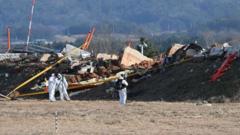Investigators have confirmed that they have successfully extracted data from one of the black boxes involved in the tragic Jeju Air crash that occurred on Sunday in South Korea. The Ministry of Transportation announced that data from the cockpit voice recorder will be converted into an audio file for further analysis. Meanwhile, due to damage sustained in the crash, the flight data recorder will be sent to the United States for specialized examination, as it is deemed unfeasible to decode locally.
This tragic accident led to the loss of 179 lives as the Boeing 737-800, which was en route from Bangkok, crash-landed at Muan International Airport. The aircraft collided with a structure at the end of the runway, resulting in an explosion. Reports indicate that only two crew members survived, with most passengers being South Korean nationals, and two being Thai citizens.
Investigators are currently considering various factors that may have contributed to the crash, including the possibility of a bird strike and adverse weather conditions. The positioning and structure of a concrete wall at the end of the runway are also being examined, as experts suggest it may have played a significant role in worsening the outcome of the incident.
Efforts to identify the victims were prolonged due to serious injuries, requiring DNA and fingerprint analysis, but all 179 passengers have now been identified, according to the acting president, Choi Sang-mok. In light of this tragedy, New Year’s celebrations across South Korea have been canceled, and a national mourning period has been declared.
In response to the incident, Jeju Air's CEO, Kim Yi-bae, announced plans for compensation for the victims' families, including covering funeral expenses. He also noted that a pre-flight inspection had revealed no issues prior to the flight. Investigations continue to uncover the full circumstances of this disaster, as officials collaborate with experts from the U.S. National Transportation Safety Board (NTSB) who have been dispatched to assist with the investigation.

















